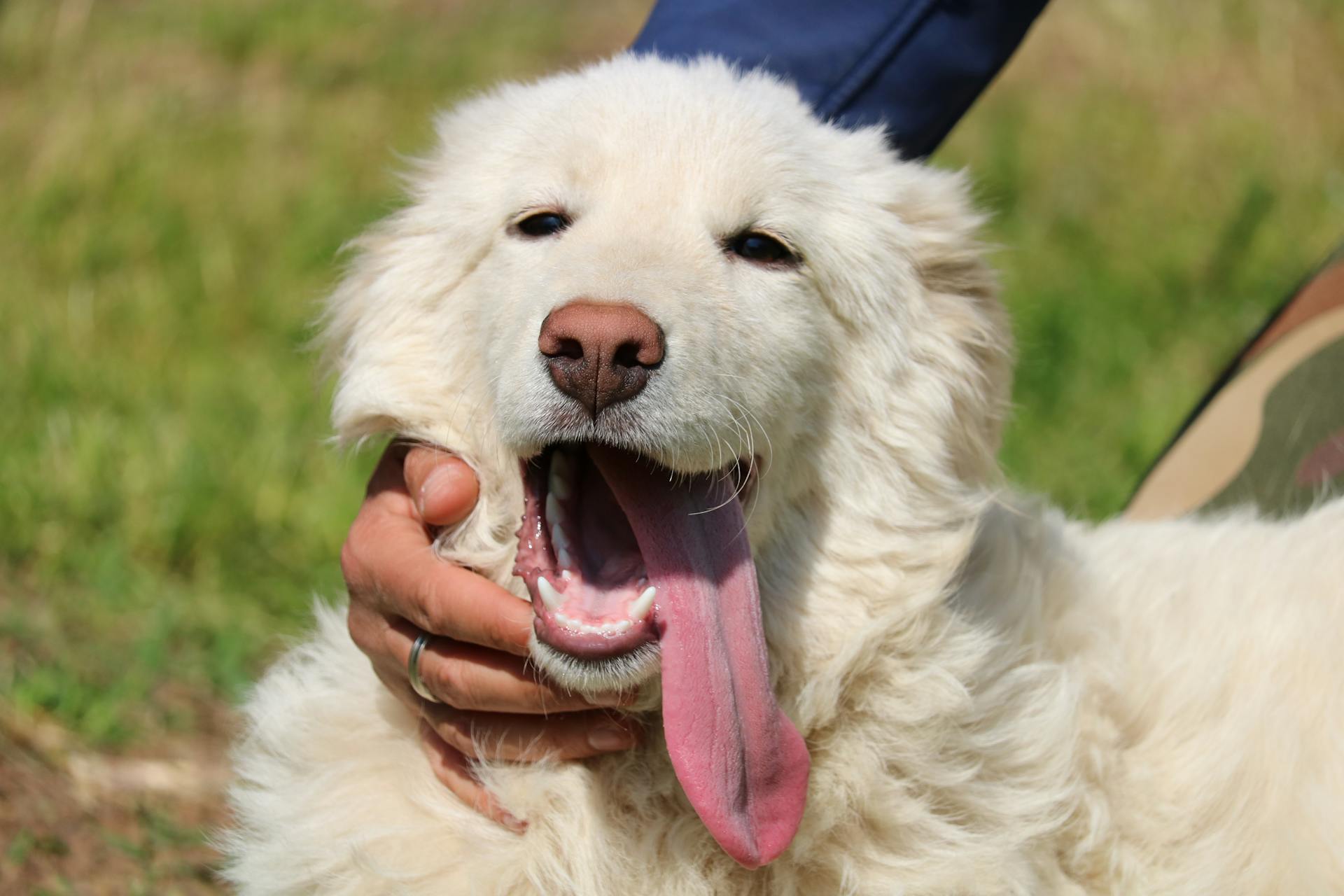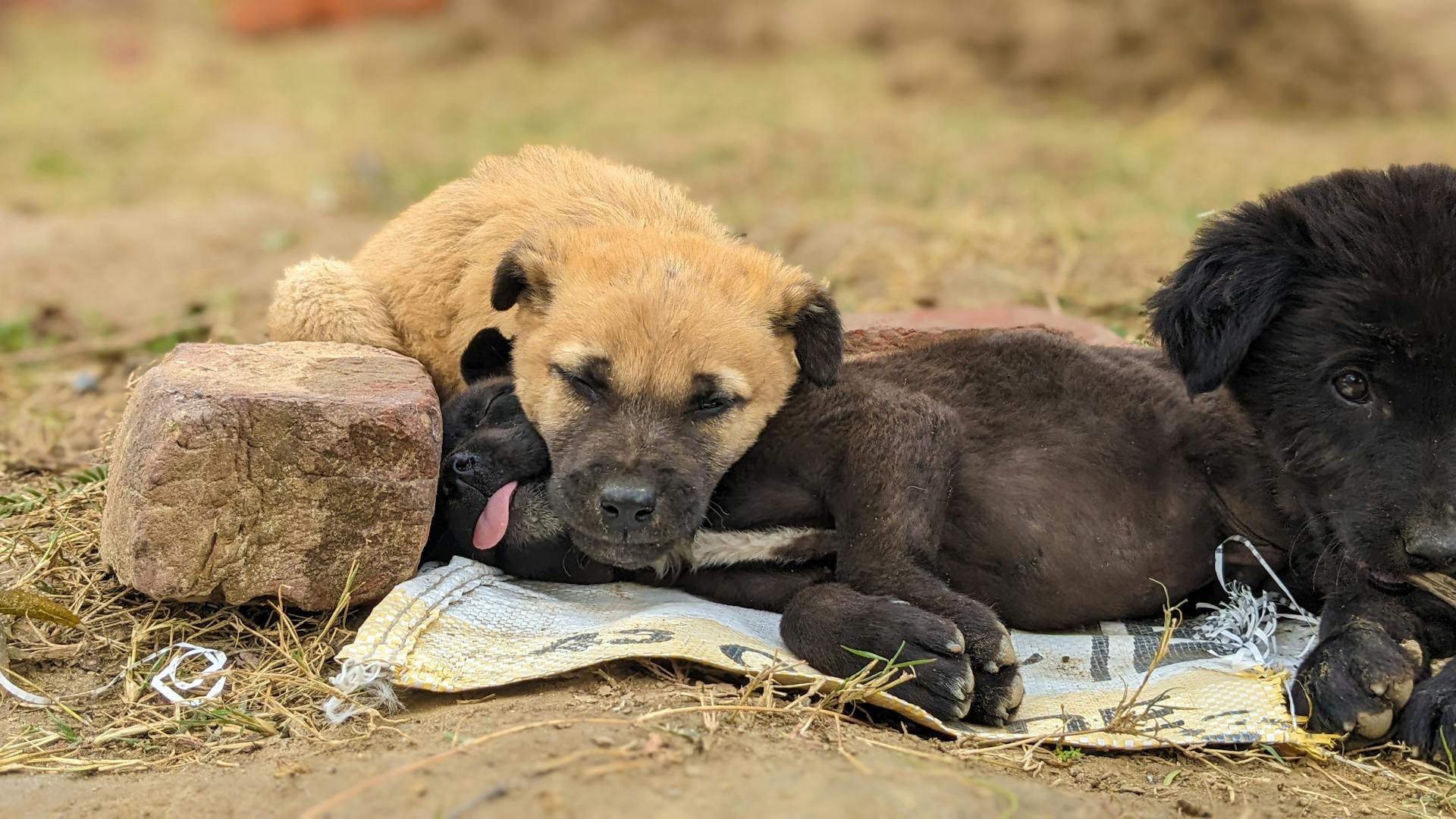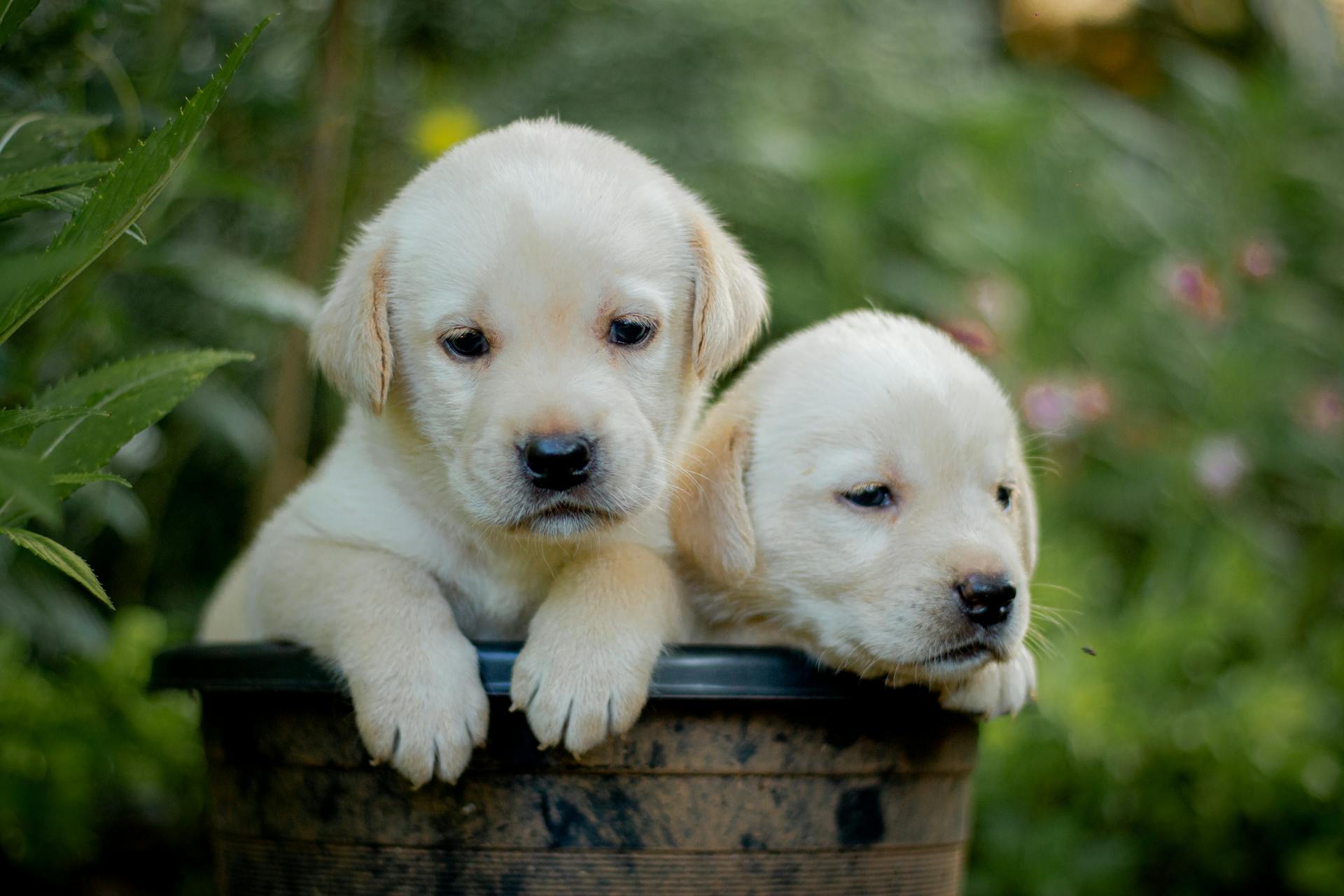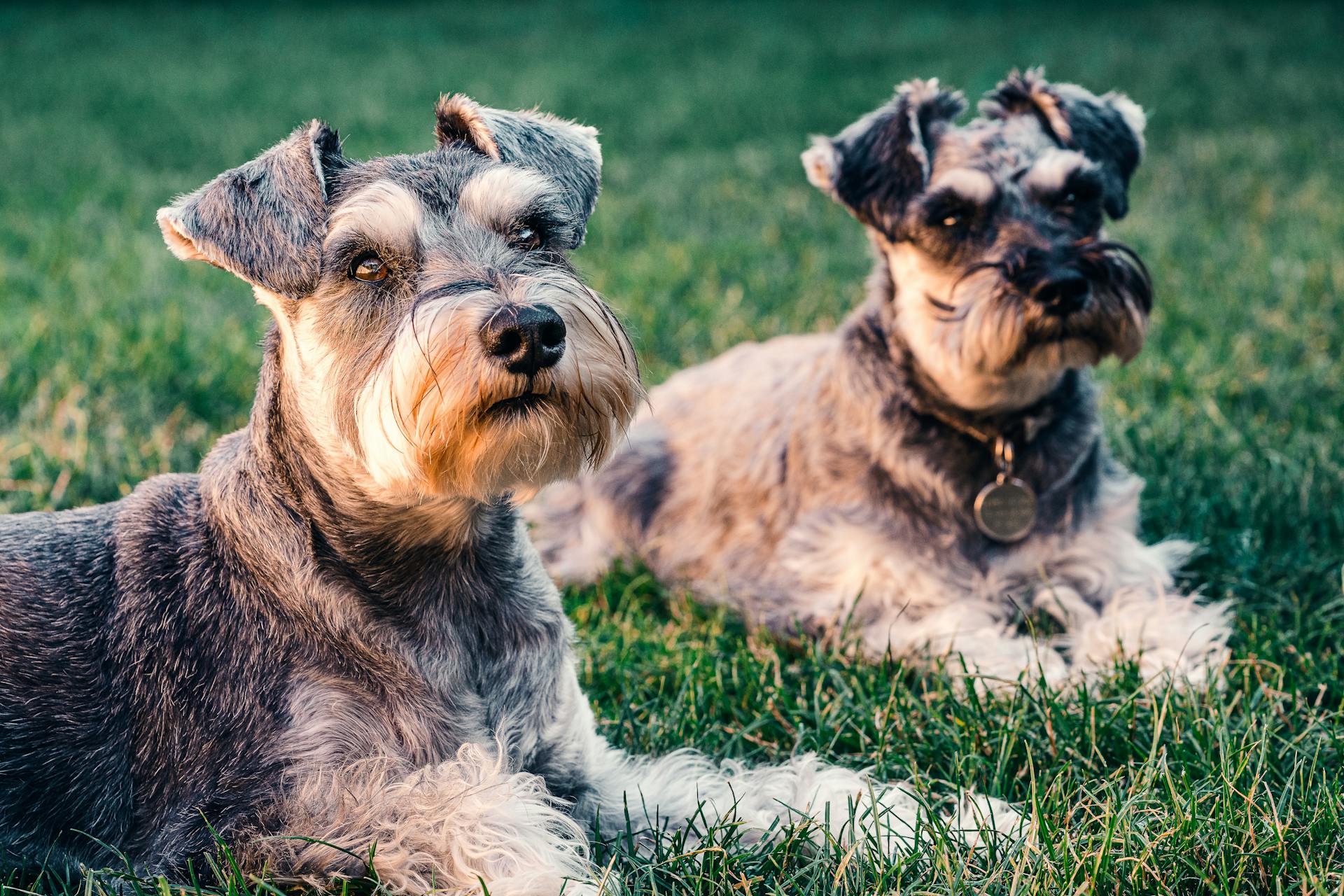
The Schnauzer Yorkie mix is a unique and lovable breed that makes an excellent companion dog.
They typically weigh between 8-18 pounds and stand about 10-14 inches tall at the shoulder.
This small size makes them perfect for apartment living, as they require minimal space to move around.
Temperament & Intelligence
The Snorkie is a fireball of fun that loves playing and chasing balls.
They're a social breed that thrives on interaction with their human pack leader and won't leave their side when they have the choice.
Snorkies are known to be barking enthusiasts, so be prepared for lots of communication - including other animals!
They adore being held and snuggled, which means don't expect much alone time on the couch or in bed.
Regular socialization is key to preventing territorial behavior in Snorkies.
With proper training at a young age, Snorkies can become happy, healthy, and obedient companions.
However, be warned that they can be stubborn and challenging during training sessions.
A firm yet loving hand is essential for successful training with this breed.
They're intelligent and curious, making them quick learners when properly motivated.
Recommended read: Potty Training Mini Schnauzer
Care and Health
Snorkies are generally a healthy breed, but like all dogs, they can be prone to certain health conditions. Gall Bladder Stones and various allergies are two common issues that can affect them.
Regular check-ups with your veterinarian can help catch these conditions early on. Brushing their teeth as often as possible with pet-safe toothpaste is also crucial in preventing dental disease, which affects up to 80% of dogs over three years old.
To monitor your Snorkie's eye health, schedule regular eye examinations with a veterinarian. This can help detect issues like cataracts, progressive retinal atrophy, and dry eye early on.
Here are some common health conditions that affect Snorkies:
- Gall Bladder Stones
- Various Allergies
- Dental disease (can be slowed with regular tooth brushing)
- Patellar luxation (can be reduced by exercising them regularly and monitoring their activity)
- Thyroid disorders (like hypothyroidism, which can cause weight gain, lethargy, and skin problems)
By being aware of these potential health issues and taking preventative measures, you can help your Snorkie live a happy and healthy life.
They're Low Shedding
The Snorkie's low shedding trait is a blessing for many owners. They tend to shed little fur, if any at all.
This helps to keep the household tidy, which is a good thing because owners will already be spending plenty of time on grooming tasks. Regular brushing can help reduce shedding even further and prevent matting.
Their low shedding coat requires regular maintenance but it's worth it for the reduced mess.
See what others are reading: Standard Schnauzer Shedding
Healthy Dogs
The Snorkie is a healthy breed due to its genetic diversity from parent breeds.
Their crossbreed between Miniature Schnauzer and Yorkshire Terrier can exhibit hybrid vigor, which means they may be healthier than their parent breeds.
Snorkies are known to benefit from this hybrid vigor, inheriting health and vitality advantages from their parents' diverse genetics.
A high-quality dry dog food without grain fillers is ideal for Snorkies.
Grown dogs need anywhere from a cup to a cup and a half of food each day, split into two separate meals.
Puppies may require more as they grow, so owners should monitor their intake closely.
Adding carrots and eggs can increase the nutritional profile of an adult Snorkie's diet, but be prepared for picky eating habits.
Readers also liked: Best Homemade Food for Miniature Schnauzer
Food & Diet
Your Snorkie will need high-quality food that is appropriate for their age and health.
Choose a commercial dog food with real meat as the first ingredient to ensure they get essential nutrients. Avoid foods with excessive fillers or artificial additives.
Grown dogs can eat anywhere from a cup to a cup and a half of food each day, split into two separate meals. Puppies may require more as their bodies grow.
Things like carrots and eggs can be added to increase the nutritional profile of your adult Snorkie's diet. This is especially helpful for picky breeds that are known to pass up any food that doesn't agree with them.
Fresh, clean water is essential to keep your pet hydrated. Make sure they always have access to a clean water source.
Limit treats to no more than 10% of their total daily calories to avoid overfeeding.
Take a look at this: Miniature Schnauzer Dog Food
Exercise
Snorkies have plenty of energy to burn and need regular exercise to stay happy and healthy.
A short walk around the block can help calm their excitement, making them a great companion for the elderly or those with physical limitations.
They yearn to play and can take care of most of their daily exercise needs indoors on their own.
Your Snorkie will need 30–60 minutes of exercise daily to stay healthy.
Grooming
Grooming is an essential part of Snorkie care, and it's not just about making them look cute.
Their thick coat sheds very little fur, which is a relief for owners who'll still be spending plenty of time on grooming tasks.
To keep their double coat from matting and tangling, brush or comb your Snorkie daily, preferably both. Slicker brushes work wonders in this task.
Regular coat trimmings are also necessary to keep their appearance neat.
Their floppy ears can trap moisture and debris, leading to ear infections, so check them regularly for signs of redness, irritation, or excess wax and clean them if needed.
Brushing your Snorkie's teeth with dog-safe toothpaste as frequently as possible is crucial.
See what others are reading: Giant Schnauzer Grooming Styles
Health and Conditions
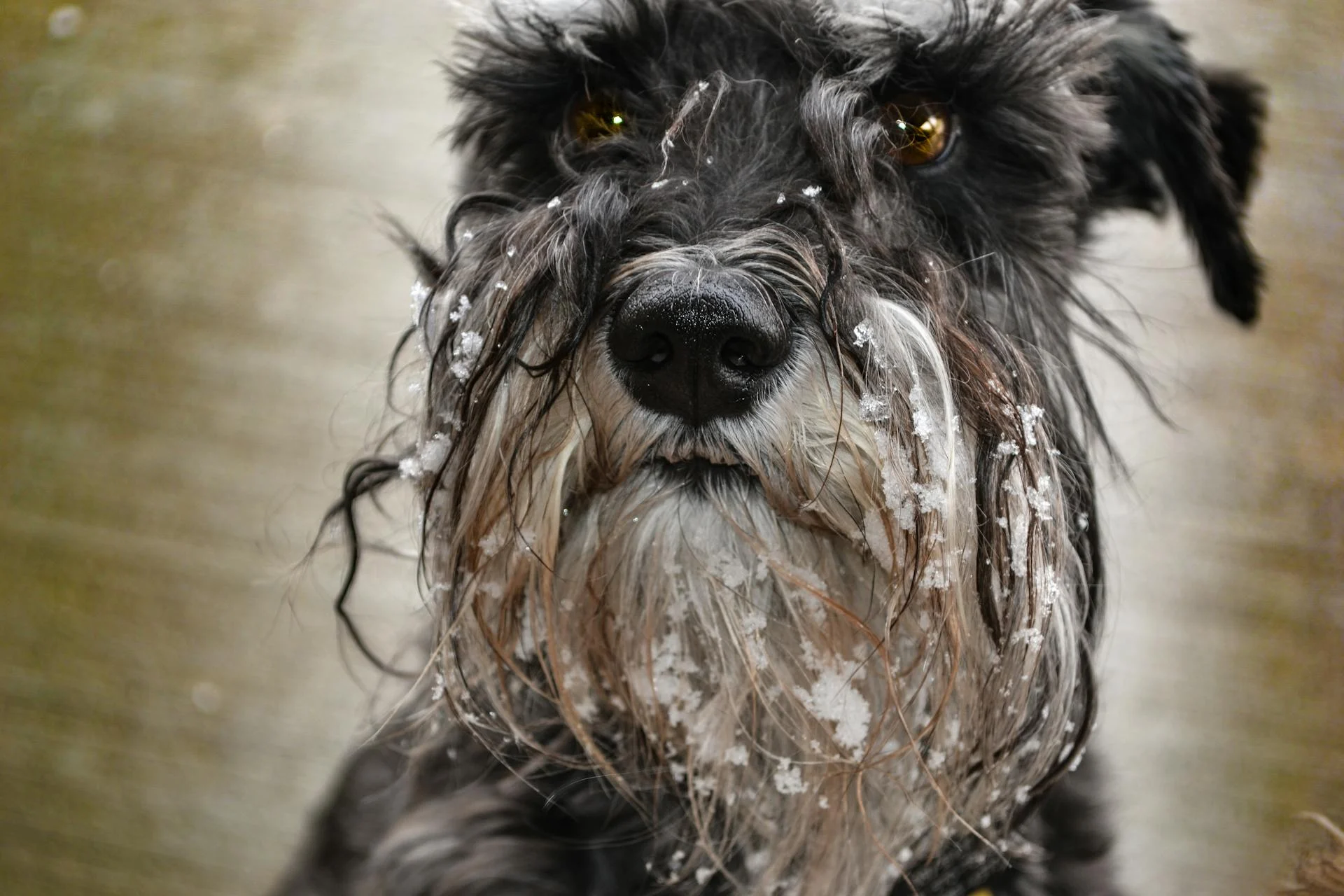
Snorkies are generally healthy dogs due to hybrid vigor from their parent breeds.
The Miniature Schnauzer and Yorkshire Terrier mix can exhibit fewer health issues than purebred versions of these breeds. However, regular veterinary check-ups are still essential for early detection and management of potential conditions.
Gall Bladder Stones and various allergies are a couple of the health concerns that Snorkies may face. These issues can be caught early with regular visits to the vet.
Dental disease is a common problem in many dog breeds, including the Snorkie. As many as 80% of dogs over three have some form of dental disease.
Brushing your Snorkie's teeth regularly with pet-safe toothpaste and scheduling frequent check-ups can help slow down dental disease progression.
Both Miniature Schnauzers and Yorkshire Terriers are prone to eye conditions, including cataracts, progressive retinal atrophy, and dry eye. Regular eye exams by a veterinarian can detect issues early on.
Regular exercise, maintaining a healthy weight, and monitoring activity can reduce the risk of patellar luxation in Snorkies.
Related reading: Half Yorkshire Terrier Half Chihuahua
Socialization and Lifestyle
Snorkies are adaptable to various living situations, but they do require attention and interaction throughout the day.
They generally don't need a large yard to play in and can thrive in apartments with regular exercise and mental stimulation.
However, their daily barking habits may be a concern for neighbors if left alone at home all day long.
Hiring a pet sitter or dog walker can help alleviate this issue and keep both the Snorkie happy and neighbors satisfied.
General Information
The Snorkie is a cross between the Miniature Schnauzer and the Yorkshire Terrier, making it a mixed breed dog. The temperament of a Snorkie can vary greatly as it can inherit characteristics from either parent.
A Snorkie's appearance can also be quite diverse, with some having the soft coat of a Yorkie and curly hair like a Schnauzer, while others may have the markings of a Schnauzer or the small stature of a Yorkie.
Some Snorkies are very intelligent and have lots of energy, requiring regular exercise and mental stimulation to prevent boredom. A fenced-in backyard can be beneficial for a Snorkie as they tend to have plenty of energy.
Here's a list of some key characteristics that may be found in a Snorkie:
- Intelligence: Some Snorkies are very intelligent.
- Energy level: Snorkies tend to have lots of energy.
- Curly hair: Some Snorkies inherit curly hair from their Schnauzer parent.
Information and Pictures
The Snorkie is a cross between a Miniature Schnauzer and a Yorkshire Terrier. It's not a purebred dog, so its temperament can vary depending on the characteristics it inherits from each breed.
To determine your Snorkie's personality, research both breeds and be prepared for any combination of traits. Some Snorkies may inherit the intelligence and energy of their Yorkie parent, while others might take after their Schnauzer parent with a more laid-back attitude.
You can expect your Snorkie to have a small stature, weighing between 8-18 pounds and standing about 10-14 inches tall at the shoulder. Their coat can be soft like a Yorkie's or curly like a Schnauzer's, often featuring markings from both breeds.
The best way to find out what your Snorkie will look like is to see pictures of their parents. Reesie, for example, had a salt-and-pepper Mini Schnauzer mother and a Yorkie father, resulting in her soft coat with black-and-tan coloring and curly hair.
Snorkies can make great pets if you're willing to provide them with plenty of exercise and mental stimulation. They thrive on attention and interaction, so be prepared for lots of playtime and training sessions.
Three Little-Known Facts
Did you know that there are some fascinating facts hidden beneath the surface? Here are three little-known facts about the topic at hand.
The shortest war in history was between Britain and Zanzibar on August 27, 1896, lasting only 38 minutes. This astonishing fact highlights the rapidity with which conflicts can escalate or resolve.
In 1969, the first humans walked on the moon during the Apollo 11 mission. Neil Armstrong's famous words "That's one small step for man" have become an iconic moment in history.
For your interest: Schnauzer Facts
Final Thoughts
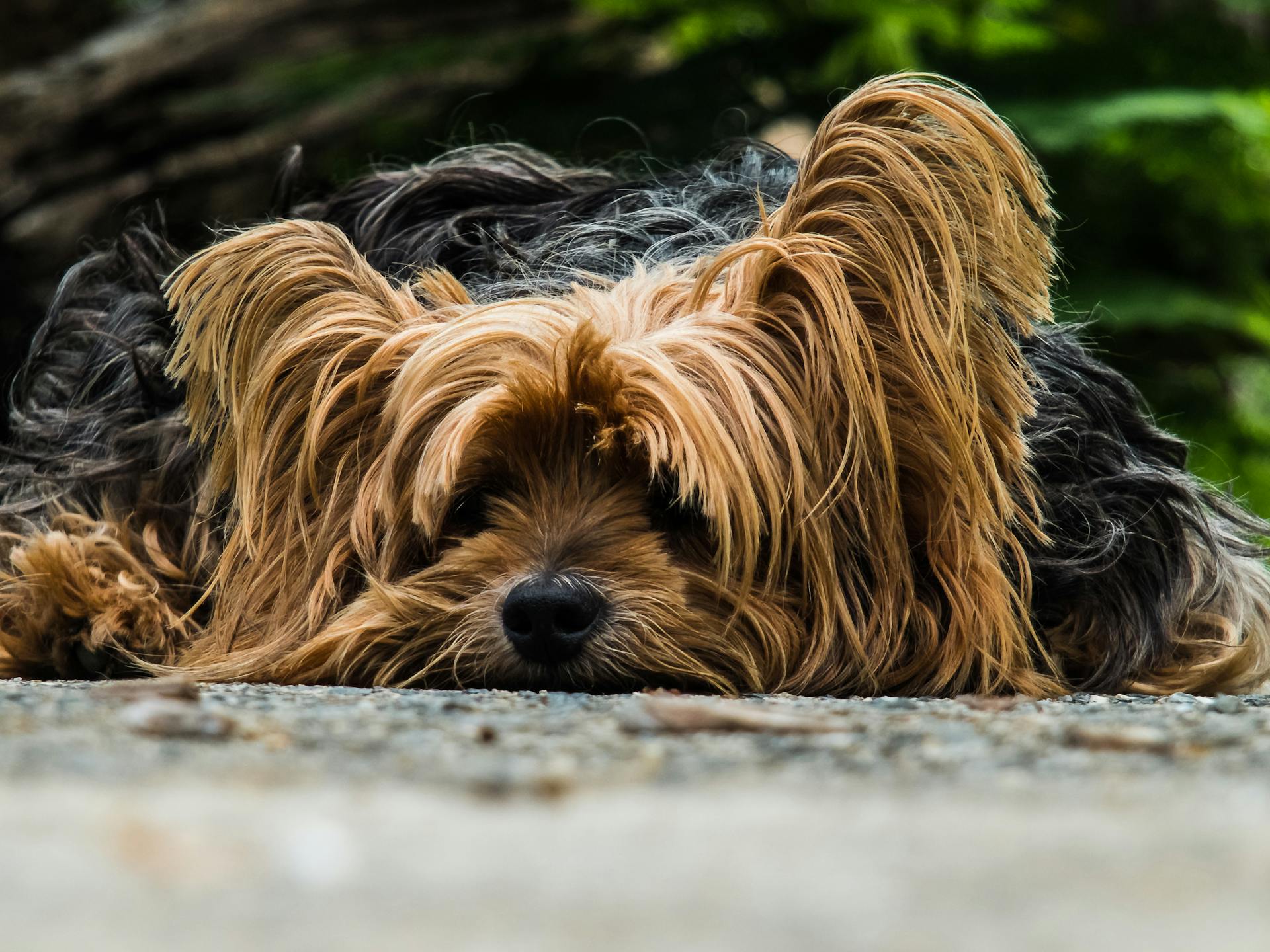
The Snorkie is a wonderful dog that thrives in apartment life due to their small size and adaptable nature.
They are generally good with children and pets, especially if socialized from an early age.
This breed can have considerable variation in coat texture and color, making each pup unique.
Their intelligence makes them relatively easy to train, but consistency is key.
Frequently Asked Questions
What is a Schnauzer yorkie mix called?
A Schnauzer Yorkie mix is commonly known as a Snorkie or Schnerrier. This adorable hybrid breed combines the best traits of Miniature Schnauzers and Yorkshire Terriers.
What does a Yorkie Schnauzer look like?
A Yorkie Schnauzer mix typically inherits the distinctive bearded face and wiry coat of a Schnauzer from its parent breed. They often have a small to medium size with a compact body.
What is the behavior of a Schnauzer Yorkie mix?
A Schnauzer Yorkie mix is intelligent, loyal, and adaptable, forming strong bonds with family members. They're always in a friendly, playful mood, making them great companions for various living situations.
How long do Schnauzer Yorkie live?
Miniature Schnauzers typically live between 12-16 years in good health. With proper care, many can reach their average lifespan of around 15 years.
How big will a Yorkie Schnauzer mix get?
A Yorkie Schnauzer mix typically stands 5-12 inches tall and weighs 8-12 pounds. This small size makes them a great companion for city living or families with limited space.
Featured Images: pexels.com
